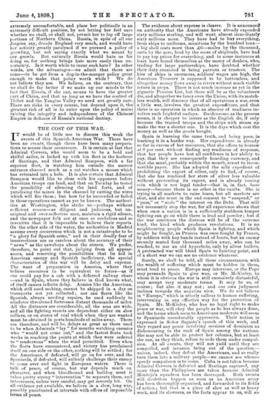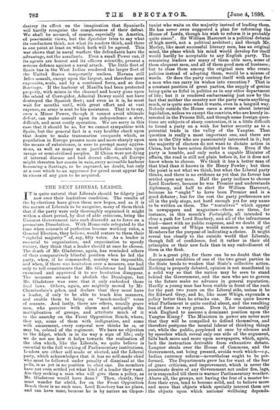THE COST OF THIS WAR.
IT would be of little use to discuss this week the events of this Spanish-American War. There have been no events, though there have been many prepara- tions to secure their occurrence. It is certain at last that Admiral Cervera, who would seem to be a bold and skilful sailor, is locked up with his fleet in the harbour of Santiago, and that Admiral Sampson, with a far superior fleet, is watching him outside the narrow entrance channel much as a cat watches a mouse which has retreated into a hole. It is also certain that Admiral Sampson would like to close with his opponent before American troops can land, and that on Tuesday he tested the possibility of silencing the land forts, and of paralysing the mines in the channel by cutting the wires which will fire them ; but how far he succeeded or failed in those operations cannot as yet be known. The authori- ties at Washington, who strike us—perhaps without sufficient reason—as diligent and judicious, but un- original and over-reflective men, maintain a rigid silence, and the newspaper folk are at once so credulous and so inventive that it is impossible to believe their reports. On the other side of the water, the authorities in Madrid assume every occurrence which is not a catastrophe to be "a glory for Spanish arms," and in their deadly fear of insurrections are as careless about the accuracy of their "news" as the newsboys about the streets. We prefer, therefore, to point out that, judging from all appear- ances, and reserving the possibilities that lie hid in American energy and Spanish inefficiency, the special characteristics of this war will be delay and expense. The want of preparation in America, where they believe resources to be equivalent to forces—as if one could pay for a cab with a deferred railway share —and in Spain, where they believe in God knows what, of itself causes infinite delay. Armies like the American, which still need making, cannot be shipped in a day on transports not yet collected ; nor can fleets like the Spanish, always needing repairs, be used suddenly to reinforce threatened fortresses distant thousands of miles. All the distances are considerable, all the seas are wide, and all the fighting vessels are dependent either on slow colliers, or on stores of coal which when they are wanted must be obtained in ports hundreds of miles away. There are therefore, and will be, delays as great as there used to be when Admirals "lay" for months watching enemies who 'would not come out," and the fastest fleets took weeks in reaching the points at which they were ordered to "rendezvous" when the wind permitted. Even when the fleets have encountered, and victory has proclaimed itself on one side or the other, nothing will be settled ; for the Americans, if defeated, will go on for ever, and the Spaniards, if defeated, will sullenly challenge their enemy to come over and fight in European waters. There is talk of peace, of course, but war depends much on character, and when bloodhound and bulldog meet it takes pretty strong " intervention " to separate them, and interveners, unless very careful, may get severely bit. On all evidence yet available, we believe in a slow, long war, possibly punctuated at intervals with offers of impossible terms of peace. The evidence about expense is clearer. It is announced on authority that the Americans have already expended sixty millions sterling, and will want almost immediately sixty millions more. They have had to buy everything,. from ships to uniforms, munitions by the hundred tons— a big shell costs more than .26—mules by the thousand, carts by the acre, food by the score of shiploads, have had to pay top prices for everything, and in some instances at least have found themselves at the mercy of dealers, who'. trading for large partnerships, have doubted whether their duty consisted in being patriots or trustees. The hire of ships is enormous, soldiers' wages are high, the American Treasury is supposed to be bottomless, and altogether money flows away in rivers without much visible return in crops. There is not much increase as yet in the gigantic Pension List, but there will be as the volunteers. die, and altogether we fancy even the Union, with its match- less wealth, will discover that of all operations a war, even a little war, involves the greatest expenditure, and that there is no operation in which an absence of readiness in- volves such frightful outlays. Burdensome as the procesa seems, it is cheaper to insure as the English do, if only because the trained troops and the ships with steam up make the war a shorter one. It is the days which cost the money as well as the goods bought.
Spain is learning the same truth, and being poor, is learning it in a harder way. Her expenditure is already so far in excess of her resources, that she offers to borrow at 8 per cent. without finding any readiness of response, that her people have lost all confidence in her ability to' pay, that they are consequently hoarding currency, and that she must, probably within the month, resort to incon- vertible paper. She has adopted the silly expedient of prohibiting the export of silver, only to find, of course,. that she has rendered her store of silver less valuable without preventing its export, and is already issuing coin which is not legal tender—that is, in fact, base money—because there is no other in the vaults. She is trying in all markets to raise loans, but all markets are shut, and she must in the end consent to "suspend," or "pass," or " scale " the interest on the Debt. That will' not necessarily stop the war, for all experience shows that when once a nation is in a sufficiently stubborn temper fighting can go on while there is lead and powder ; but if the war continues the distress will be of the extreme kind, the kind which produces revolutions. It is no. neighbouring people which Spain is fighting, and which! might be fought, as Prussia was once fought by France, by soldiers with hay bands instead of boots, but an enemy securely seated four thousand miles away, who can be reached, to use an old hyperbole, only by silver bullets. A protracted war will bleed Spain to fainting point, and of a short war we can see no evidence whatever.
Surely, we shall be told, all these circumstances, witil the wealth of suffering which must be hidden in them, must tend to peace. Europe may intervene, or the Pope may persuade Spain to give way, or Mr. McKinley, to whom it is obvious the war is still excessively distasteful, may accept very moderate terms. It may be so, of course ; but also it may not ; and our own judgment. inclines towards the negative view. We do not believe in "Europe," which is utterly callous to human suffering, intervening in any effective way for the protection of Spain. Mr. McKinley, who has no legal right to make peace or war, will obey the people as he has always done, and the terms which seem to Americans moderate will seem. to Spaniards unendurably oppressive. Their notion expressed in Seftor Sagasta's speech of this week, and they regard any peace involving cessions of dominion as dishonouring to the rank of Spain among the nations. She may not be able to protect her colonies, but at least she can, as they think, refuse to cede them under compul- sion. At all events, they will not yield until they are compelled, and invasion being out of the question— unless, indeed, they defeat the Americans, and so really turn them into a military people—we cannot see whence speedy compulsion is to come. Cuba is not taken because Admiral Cervera is defeated and Santiago captured, any more than the Philippines are taken because Admiral Montojo's squadron has been destroyed. Both events will doubtless happen as soon as an American army- has been thoroughly organised, and forwarded to its fields of action ; but that is a piece of slow as well as heavy work, and its slowness, as the facts appear to Us, will BO' ,destroy its effect on the imagination that Spaniards, will hardly recognise the completeness of their defeat. We shall be accused, of course, especially in America, of pessimistic views, but the Spectator tries to say what its conductors think, not what its readers think, and there is one point at least on which both will be agreed. This war shows that in naval warfare the defendants have the advantage, not the assailants. Even a small Power can, if its agents are honest and its officers scientific, present a serious defence against a naval attack. The little fleet of Spain has in the West Indies rendered the larger fleet of the United States temporarily useless. Havana still lefies assault, except upon the largest, and therefore most expensive, scale, and by a combined force, and so does Santiago. If the harbour of Manilla had been protected properly, with mines in the channel and heavy guns upon the island of Corregidor, Admiral Dewey could not have destroyed the Spanish fleet ; and even as it is, he must wait for months until, with great effort and at vast expense, an army is sent to his assistance. That is to say, even a Minor Power, though it cannot avoid ultimate defeat, can make assault upon its independence a slow, difficult, and most costly operation. We are sorry in this case that it should be so, for we cannot sympathise with Spain, but the general fact is a very healthy check upon that desire to make transmarine conquests which, as population in Europe presses more and more sharply upon the means of subsistence, is sure to prompt many aggres- sions, as well as many m3re justifiable descents upon savage or semi-civilised peoples. If China were not dying of internal disease and bad decent officers, all Europe might threaten her coasts in vain, every accessible harbour becoming a Santiago, to be captured, no doubt, but only at a coat which to an aggressor for greed must appear far in excess of any gain to be acquired.



































 Previous page
Previous page